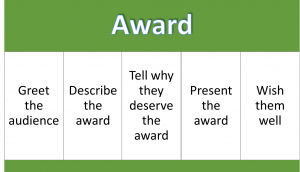23 Award Speech: And the Winner is…
Lynn Meade

People in leadership have the privilege of recognizing the achievement of others by giving them awards. This is an important moment, and you want to help make it special. In this chapter, I will teach you the five-step process on how to give an award, I will share with you practical things to think about in terms of setup and execution, and finally, I will share with you ways to elevate this speech to a professional level.
Ceremonial Speaking Wheel

All ceremonial speeches should include the trio –narration, magnification, and identification.
Identification
You are not talking to an audience; you are sharing with an audience. You are celebrating with them and collectively celebrating shared values and shared appreciation for their accomplishments. Saying “we” are here to honor the recipient and reminding the audience of shared values helps the audience to be a part of the process.
Narration
The use of story helps the audience to be drawn in and want to listen. The narration can be about the organization, how the award was formed, or about the person receiving the award. It is better to tell a story of a complex problem they solved instead of saying “they are a good problem solver.”
Magnification
Take a trait of the individual and magnify it. I’m not talking about superfluous embellishment; I’m talking about honest elaboration. If they discovered an accounting mistake, talk about the difficulty of noticing such a mistake, and talk about the financial impact on the group because the correction was made. In short, find heroism in events where others might not notice. Magnification means finding the extraordinary which is often hidden: loyalty, work ethic, going the extra mile, and standing up under adversity. Let us truly see the person’s accomplishments with a bright spotlight, not just a little candlelight.
Now you know of the key elements that should be in your speech, let’s talk about the specific five-step structure of an award speech.
Five-Step Award Process
Greet the Audience
Welcome the audience to the event. Thank them for attending and address any special guests or sponsors.
Describe the Award
Open your speech with a greeting and then describe the award. Tell about the organization that is giving the award and why this award was created. Who founded this award? What’s the story behind the award? What makes this award unique? Describe the criteria for selecting a winner. Who decides? What are the criteria?
Tell Why They Deserved the Award
Describe the attributes of the person who will be receiving the award. If possible, tell a story about the person. The more details, the better. People who come to awards ceremonies like to be inspired and they like to feel included. The more you can make everyone feel like they are part of something special, the better your speech will be. This is the most important part of the award. Make the recipient feel special by telling stories of their achievements and calling out specific highlights of their achievements.
If there are multiple recipients for the same award, for example, awards for everyone who completed upper-level training, you can highlight the task they had to do to receive the recognition. You can tell a story about one part of the training that will be familiar to those who completed it.
Present the Award
Announce the person’s name who will be receiving the award. Consider writing yourself a note on how to pronounce the name. Find out in advance their preferred name and if you should use an honorific. As they approach to claim the award, be sure that they know where they are supposed to stand. If you didn’t tell them before the presentation, you should indicate in some way where they should go and what they should do. Do they stand beside you or somewhere else? Will there be a handshake? Do they hold the award? Do they grab the award and go or do they stay while you talk about them? This is their moment, and you don’t want to make them feel awkward because they don’t know what they are supposed to do.
Present the award to them with a handshake and a smile. Be sure to pause so the photographers can take a picture.
Wish Them Well
While they are still upfront, give a statement that wishes them well. This is done most effectively when it is connected to the theme of the award. If it is a sales award, make reference to sales, if it is a teaching award, make reference to teaching, if it is an academic award, make reference to how they will use their academics.
Practical Mechanics
You have your speech written and you are setting up the room where you will give the award. It is time to think of some very practical things like the location of the award, the location of the handshake, and the location of the photographer.
Location of the Award
Where are you going to set the award? If there are multiple awards, you will likely need to set up a table and have someone help pass out the awards. Before the event, you should have someone pretend to get an award to help you figure out any potential issues.
Location of the Handshake
Where are you going to do the handshake? When they come up and receive the award, are you going to shake their hand and give them the award or will another distinguished leader give the award and the handshake? If you are standing behind the podium, it is hard to shake hands and get a good photo, so it will be important that you step in front of the podium or off to the side for the handshake.
Location of the Photographer
Where are you going to have the photographer stand? In high-profile awards, there may be a professional photographer who requires a special setup. Always be mindful of where they will be located and make sure they don’t block the view from the other guests. In addition, most people will have family, friends, colleagues in the audience who will want a picture. Make sure you have an aisle clear, so photo takers have a clear view. Write yourself a note to pause and let the pictures be taken.
Handshake Matters
- Shake with the right hand.
- Hand the award with the left hand.
- The award or certificate goes on top.
- Pause, smile, and face the camera.
Handshake tips. When people get nervous, their hands may get sweaty. Keep a tissue in your pocket to wipe your hand on just in case. When you go in to shake someone’s hand open your hand wide and go in for the web of skin between the thumb and pointer finger. A typical handshake is two to three pumps, but an award handshake is typically two pumps and a long pause while pictures are being taken.
Taking it to the Next Level
To elevate the quality of your speech, add advanced language devices sometimes called colorful language. Let’s talk about the three main types that can make you sound like a speech professional–Theme, alliteration, and parallel construction.
More on using colorful language in a speech.
Alliteration: Repeat the same sound three times
- Jake is polished, practical, and professional
- LaShay’s got grit and goes after things that impact
Parallel Construction: Repeat the same phrase at least three times.
- Passionate about students…
- Passionate about learning…
- Passionate about teaching…
Theme: Pick a theme that fits the person and the award
- Accounting is his life.
- He can multiply his impact.
- The bottom line is…
- When you look at his character, it all adds up.
Remember, your award speech is not about you– it is about the recipient and people who care about them. It is about creating a celebratory atmosphere where the audience and the recipient can feel good. Doing the work it takes to write the speech well will make a big difference. The joy you will feel from making someone else feel special will be its own reward.
Key Takeaways
Remember this!
- The more details about why the person deserves this award the better.
- Include identification, narration, and magnification.
- Practice your handshake and how to hand the award to the recipient.
- Tell them what the award is, tell them why they deserve the award, give them the award, wish them well.
Media Attributions
- Award trophy © Giorgio Trovato is licensed under a CC BY (Attribution) license
- Colorful language wheel © Lynn Meade is licensed under a CC0 (Creative Commons Zero) license
- Award Chart © Lynn Meade is licensed under a CC0 (Creative Commons Zero) license


